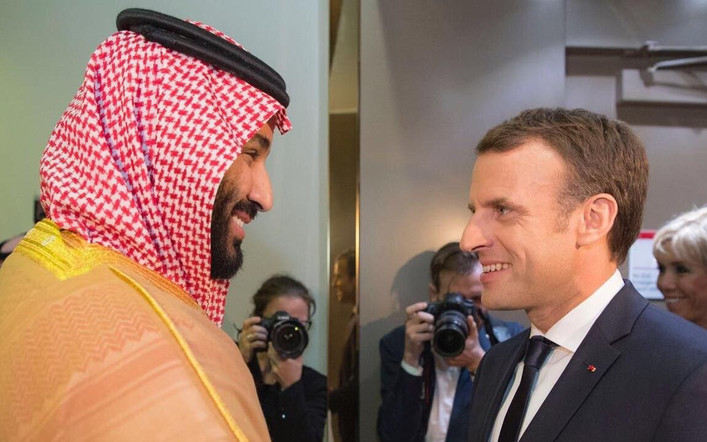6 April 2018 – Today, Americans for Democracy & Human Rights in Bahrain (ADHRB) sent two letters, to French President Emmanuel Macron and French Foreign Minister Jean-Yves Le Drian, ahead of Saudi Crown Prince Mohammed bin Salman’s visit to Paris on 9 – 10 April. In both letters, ADHRB urged President Macron and Foreign Minister Le Drian to raise concerns over Saudi Arabia’s widespread and systematic human rights violations and to embed human rights in any economic and security discussions.
Mohammed bin Salman’s visit to Paris comes after stops in London and the United States, including in New York, Washington DC, and Silicon Valley. After Paris, bin Salman will visit Madrid, in what news outlets have called a “global diplomatic charm offensive.” During his visits to the United Kingdom and the United States, bin Salman addressed UK-Saudi, and US-Saudi bilateral relations, the kingdom’s Vision 2030 for Sustainable Development, security and countering terrorism, the role of religion in Saudi society, business deals, and economic growth and development.
In both letters, ADHRB expresses concern that bin Salman’s visit to Paris and to other influential Western capitals is an attempt to whitewash Saudi Arabia’s widespread and systematic human rights abuses. While bin Salman has overseen several developments in women’s rights, including Vision 2030’s goal to increase women’s participation in the workforce, the envisioned increase, 22 percent to 30 percent, is hardly a cause for celebration. Nor have the decisions to allow women to enter three sports stadiums and study in universities resolved the structural barriers Saudi women face every day due to the continued functioning of the pervasive guardianship system. Fundamentally, as long as the guardianship system remains in place, Saudi women will face persistent gender inequality.
ADHRB also raises concerns that Mohammed bin Salman’s discussions of security and his focus on countering terrorism serve to distract from Saudi Arabia’s human rights violations. For example, beginning in 2011, the kingdom has used its counter-terror legislation and courts to prosecute and jail human rights defenders and peaceful activists, including members of the kingdom’s Shia Muslim minority community. Under the guise of countering terrorism, bin Salman has jailed dozens of peaceful dissidents and human rights defenders, including members of the Saudi Civil and Political Rights Association, and overseen an increase in the number of Shia Muslims at risk of execution because of their participation in peaceful protests. Moreover, in discussing the importance of countering terrorism and regional security, ADHRB expresses concerns that bin Salman is attempting to whitewash the kingdom’s role in the war in Yemen and the man-made humanitarian catastrophe that has unfolded.
Husain Abdulla, ADHRB’s Executive Director: “France has long claimed to support human rights and the principles of liberté, fraternité, and equalité. With Mohammed bin Salman visiting Paris and meeting with French President Macron this is an opportunity for France to demonstrate its commitment to these principles. During their meeting President Macron must make it clear to bin Salman that there can be no sustainable economic reform or growth without human rights reform and there can be no sustainable stability – domestic or regional – as long as the Saudi government systematically violates its residents’ rights to the freedoms of expression and opinion, assembly and association, religion and belief, and press. If Mohammed bin Salman wants to appear as a reformer, he must first institute human rights reforms and pass and enforce laws protecting and promoting political and civil liberties.”
ADHRB calls on both President Macron and Foreign Minister Le Drian to raise human rights concerns in his meeting with Saudi Crown Prince Mohammed bin Salman. ADHRB further urges President Macron and Foreign Minister Le Drian to call on bin Salman to include international human rights principles and protections in the kingdom’s economic and development and security agendas. Saudi Arabia will not be able to effectively improve its economy unless it institutes reforms promoting fundamental freedoms. Nor will it be able to ensure stability without incorporating respect for human rights.





